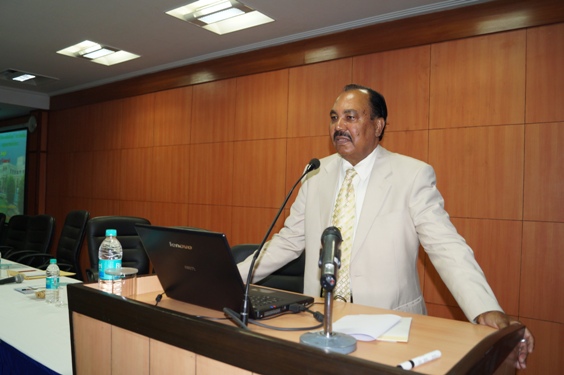04 Jan 2013|Noida | Amity University Campus, Sector-125 Noida
Prof. (Dr) R. P. Singh, Secretary General - Indian Agricultural Universities Association delivers lecture on "Gains of Green Revolution in India: Problems & Opportunities” during AIC lecture series

Prof. (Dr) R. P. Singh, Farming Systems Specialist, Secretary General, Indian Agricultural Universities Association (IAUA) delivered a lecture on "Gains of Green Revolution in India: Problems & Opportunities” at Amity University, Sector-125, Noida.
Dr. R. P. Singh stated that India has a long history of wheat cultivation spanning over 4000 years. Wheat growing farm families identified and maintained a variety of genetic resources of wheat varying for several economic traits. With the advent of wheat revolution things changed for betterment and from the year 2000 onwards India produced regularly 70 MT of wheat grain per year. This amount was more than the annual domestic requirement and enabled the creation of adequate buffer stocks to thwart the drought and other calamities.
He also added that improved rural infrastructure is also playing a key role behind the agriculture sector's comeback trail. With better rural infrastructure, it is comparatively easier and cost-effective to bring farm produce to the market. Better rural roads, more godowns and cold storages, improving rural electricity supply, will all result in faster growth in agriculture. Even Horticulture is playing a vital role in India with diverse soil and climate comprising several agro-ecological regions which provides ample opportunity to grow a variety of horticulture crops. These crops form a significant part of total agricultural production in the country comprising of fruits, vegetables, root and tuber crops, flowers, ornamental plants, medicinal and aromatic plants, spices, condiments, plantation crops and mushrooms. Horticultural crops play a unique role in India’s economy by improving the income of the rural people. Cultivation of these crops is labor intensive and as such they generate lot of employment opportunities for the rural population. Fruits and vegetables are also rich source of vitamins, minerals, proteins and carbohydrates etc. which are essential in human nutrition. Hence, these are referred to as protective foods and assumed great importance as nutritional security of the people.
Since the evolution of mankind, agriculture has been the main source of occupation. Even in the 21st century, more than 75 per cent of rural population still depends on agriculture for their livelihood and are involved in the production of food and raw materials. With the advancement of technology in the industry of agriculture has gone through a makeover — newer machines requires less hard work, labor and is time saving. From tractors, harvesting tools to fertilizers and other resources, farmers are picking up the trend and using the concept of organic farming and application of science and technology to their otherwise age-old methods. Therefore, technological improvements has also played a very important role in helping Indian agriculture grow fast and help in attaining gains from green revolution remarked Dr. Singh. Conservation agriculture is also known as the next generation Green revolution which is the integration of ecological management with modern, scientific, agricultural production.
Conservation Agriculture is characterized by three principles which are linked to each other, namely:
- Continuous minimum mechanical soil disturbance
- Permanent organic soil cover
- Diversified crop rotations in the case of annual crops or plant associations in case of perennial crops
Applying "Conservation Agriculture" means that farmers drastically reduce tillage and keep a protective soil cover of leaves stems and stalks from the previous crop. This cover shields the soil surface from heat, wind and rain, keeps the soils cooler and reduces moisture losses by evaporation. Less tillage also means lower fuel and labor costs, and farmers need to spend less on heavy machinery. Crop rotation over several seasons is essential to minimize the outbreak of pests and diseases said Dr. Singh.
Dr. Ashok Kumar Chauhan, Founder President, Amity Group said that the lecture was very enlightening as Dr. Singh has given a helicopter view of the condition of agriculture sector in India, its related problems and opportunities. To improve the condition of agriculture sector of India there is a need to improve agricultural marketing through regulation of markets to create orderly and transparent marketing conditions. By and large, this policy can benefit farmers as well as consumers.